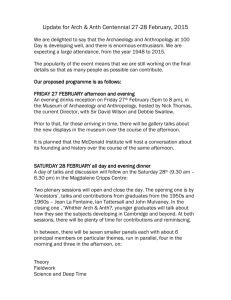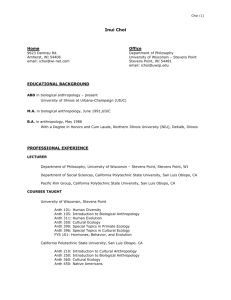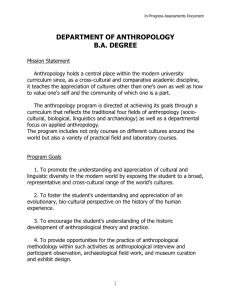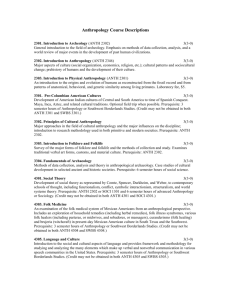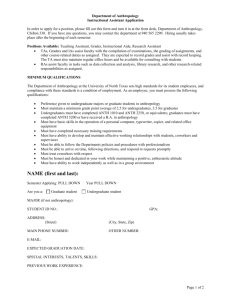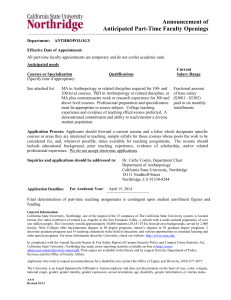anthropology policy
advertisement
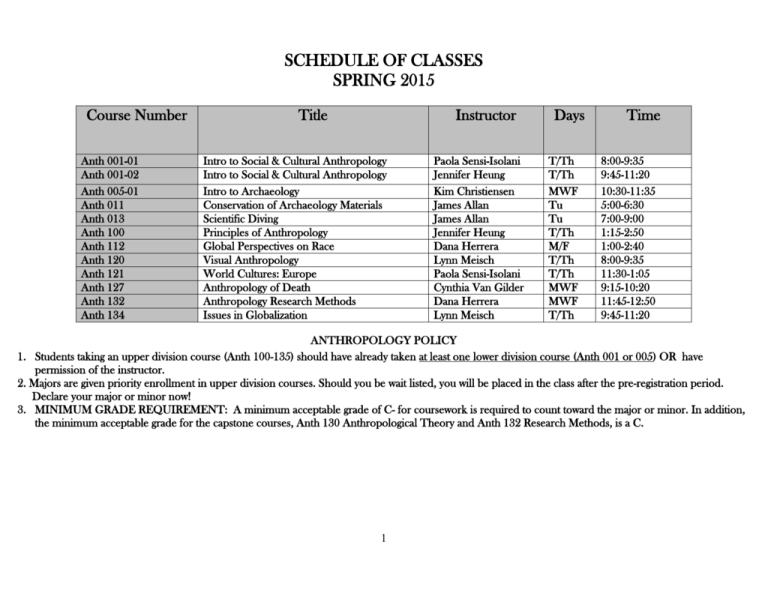
SCHEDULE OF CLASSES SPRING 2015 Course Number Anth 001-01 Anth 001-02 Anth 005-01 Anth 011 Anth 013 Anth 100 Anth 112 Anth 120 Anth 121 Anth 127 Anth 132 Anth 134 Title Instructor Intro to Social & Cultural Anthropology Intro to Social & Cultural Anthropology Intro to Archaeology Conservation of Archaeology Materials Scientific Diving Principles of Anthropology Global Perspectives on Race Visual Anthropology World Cultures: Europe Anthropology of Death Anthropology Research Methods Issues in Globalization Paola Sensi-Isolani Jennifer Heung Kim Christiensen James Allan James Allan Jennifer Heung Dana Herrera Lynn Meisch Paola Sensi-Isolani Cynthia Van Gilder Dana Herrera Lynn Meisch Days T/Th T/Th MWF Tu Tu T/Th M/F T/Th T/Th MWF MWF T/Th Time 8:00-9:35 9:45-11:20 10:30-11:35 5:00-6:30 7:00-9:00 1:15-2:50 1:00-2:40 8:00-9:35 11:30-1:05 9:15-10:20 11:45-12:50 9:45-11:20 ANTHROPOLOGY POLICY 1. Students taking an upper division course (Anth 100-135) should have already taken at least one lower division course (Anth 001 or 005) OR have permission of the instructor. 2. Majors are given priority enrollment in upper division courses. Should you be wait listed, you will be placed in the class after the pre-registration period. Declare your major or minor now! 3. MINIMUM GRADE REQUIREMENT: A minimum acceptable grade of C- for coursework is required to count toward the major or minor. In addition, the minimum acceptable grade for the capstone courses, Anth 130 Anthropological Theory and Anth 132 Research Methods, is a C. 1 ANTH 001 Intro to Social/Cultural Anthropology ANTH 005 Intro to Archaeology Professor Paola Sensi Isolani 001-01 Professor Jennifer Heung 001-02 Kim Christiensen T/Th 8:00-9:35 T/Th 9:45-11:20 What is culture and how important is it in explaining the marvelous variations we see in human behavior around the world? Are gender roles fixed? Can you distinguish religion from magic? What do anthropologists do, and how can anthropology contribute to a better world? Besides giving you a grounding in the basic concepts of anthropology, this course will help you answer these questions through readings on the lives of people in different cultures throughout the world: drug dealers in New York, the world of a Maasai warrior in Africa, what it’s like to grow up as a poor Mayan in Guatemala (and eventually win the Nobel Peace Prize), life in an Iraqi village before Saddam Hussein, how Native South Americans cope with globalization, and the mysterious rites and rituals of American college students. The readings, class discussions, and lectures will be supplemented by slides, videos, CDs, and DVDs. This class is recommended for 1st and 2nd year students (except for Anth & Soc majors & minors). Counts towards Core MWF 10:30-11:35 Do the ancient civilizations of Mesoamerica or the Middle East fascinate you? Have you ever tried to imagine what life must have been like living in a painted cave and hunting for a living? Have you ever wondered how writing was invented? Archaeology is the study of the life ways of past cultures based on their material remains, like artifacts. In this class we will learn about how archaeologists study kinship, gender, religion, art, economics, etc., in ancient societies. We will also discuss how archaeology enhances our understanding of historical and contemporary cultures. Students will have the opportunity to research an archaeological site of their choice, as well as try some hands-on archaeological activities. Counts towards Core Curriculum requirements Social, Historical, Cultural Understanding and Global Perspective. FULFILLS DIVERSITY REQUIREMENT Curriculum requirements Social, Historical, Cultural Understanding and Global Perspective. FULFILLS DIVERSITY REQUIREMENT 2 ANTH 011 Conservation of Archaeology Materials ANTH 013 Scientific Diving Professor Jim Allan Professor Jim Allan Tu 5:00-6:30 p.m. This .25 activity courses will provide students the opportunity to analyze, document, and catalog artifacts recovered from archaeological excavations conducted at Fort Ross State Historic Park. The Russian American Company established Fort Ross in 1812 on the Sonoma County coast. It is the site of the first shipyard on the west coast of the United States, and its larger industrial complex included a tannery, smithy, cooperage, and brickmaking operation. The archaeological evidence of each of these enterprises was recovered during several archaeological investigations and students will be analyzing, documenting, cataloging, and preparing the artifact collection so that it can be archived in the California Department of Parks and Recreation’s archaeological repository. Tu: 7:00-9:00 p.m. The Scientific Diver class is open to all certified scuba divers who wish to obtain the American Academy of Underwater Sciences Scientific Diver authorization. It is primarily intended for students intending to participate in the 2015 Field School in Maritime Archaeology offered in Bermuda, but is open to anyone wishing to pursue advanced diver training. Students who are not certified scuba divers may contact SMC’s Diving Safety Officer, Dr. Stephen Smith (ses13@stmarysca.edu) for information on how to obtain parallel certifications. All students participating in Anth 013 will pay a fee of $120.00 to cover the cost of training materials 3 ANTH 100 Principles of Anthropology Professor Jennifer Heung ANTH 112 Global Perspectives on Race T/Th 1:15-2:50 This course provides students with an introduction to the methods and theories of American anthropology. It is an important transition course for all majors and minors who are starting to take upper division courses in anthropology and archaeology. Specifically, it is designed to strengthen students' writing and research skills, as well as their fluency in anthropological analysis. These skills are intended to support success in all upper division courses, especially the senior capstone courses. It should be taken as soon as possible in either the sophomore or junior year. Please note that there is a $35 materials fee for this class. Enrollment is limited to Anthropology majors and minors only. Professor Dana Herrera M/F 1:00-2:40 This course examines the theoretical underpinnings of "race" and "ethnicity" as culturally constructed models. Ethnographic case studies from a variety of international regions, including the United States, supplement lectures on such topics as scientific racism, discourse analysis, and eugenics. All Anthropology majors and minors (and Archaeology) graduating in 2014 are *required* to take Anth 100 in Spring 2013. All Anthropology majors and minors (and Archaeology) graduating in 2015 are *required* to take Anth 100 in Spring 2013 or Spring 2014. Prerequisite: Anth 001: Introduction to Social and Cultural Anthropology AND at least one upper division Anthropology class 4 ANTH 120 Visual Anthropology Professor Lynn Meisch ANTH 121 World Cultures: Europe T/Th 8:00-9:35 Is a picture worth a thousand words? Can we capture reality with a camera? Film and photography are powerful media for the representation (or misrepresentation) of social and natural worlds. Photographic images are indispensable tools for social scientists, journalists, creative artists, politicians, and advertising executives. In this course we will examine the visual representations of human lives with an emphasis on the documentary use of film and photography in anthropology and everyday life, and the ethical issues involved. Students will do a visual Anthro project while learning what goes into effective visual presentations (posters, PowerPoint etc.). Professor Paola Sensi-Isolani T/Th 11:30-1:05 What is Europe and what is European? What holds Europe together and what pulls it apart? These are questions many ask as the Europe of old has been transformed by expanding borders and the influx of immigrants from other continents. This course will focus on issues of pressing interest to Europeans and to those American students who would like to understand just what Europe stands for and how it differs in many ways from the U.S. We will read and discuss a range of ethnographic texts that focus on class, gender, ethnicity and race. As we look at the increasing multi-cultural, multi-ethnic, multi-racial face of Western Europe we will explore changes that Europe has undergone in the last decades. 5 ANTH 127 Anthropology of Death Professor Cynthia Van Gilder ANTH 132 Anthropology Research Methods MWF 9:15-10:20 This course will explore the fascinating variety of cultural responses to the experience of death. Although human mortality is universal, interpretation of its significance is profoundly cultural, and as such, profoundly varied around the globe. Our exploration will take us into the study of the anthropology of emotions, rites of passage, politics and ideology, as well as the archaeology of mortuary sites. We will take a cross-cultural approach to the study of rituals surrounding mortality, memory, monuments, and bereavement. Case studies will include cannibals, headhunters, ancient Egyptians, medieval Europeans, and contemporary Americans, to name a few. Students will also have the opportunity to pursue a research project to suit their own interests. Professor Dana Herrera MWF 11:45-12:50 The course focuses on research methods and is designed to give you hands-on experience in designing and conducting social science research. You will learn a variety of ethnographic field methods including mapping, interviewing informants, participant observation, collecting life histories, analyzing folklore content, focus groups, survey research and the use of archival data. This course is required for majors and intended for Juniors and Seniors. It is the second part of the Theory/Methods sequence Please note: This course can be taken to satisfy the upper division requirement in historical archaeology for archaeology students. 6 ANTH 134 Issues in Globalization Professor Lynn Meisch T/Th 9:45-11:20 Globalization, the increased frequency by which everything from people and ideas to diseases and commodities move around the globe, is here, happening, and raises a number of issues: who benefits and who loses? What happens to indigenous peoples suddenly confronted by rapid change? (The answer might surprise you). After a grounding in the basic concepts and theories of globalization, we will study its effects by reading ethnographies and articles on such topics as international tourism, drug smuggling and human trafficking. What happens when the indigenous people of Otavalo, Ecuador, travel abroad to play music and sell crafts? Why are members of a Salvadoran street gang called "Gangsters without Borders"? How did denim go international (and who makes big bucks on this)? Our aim is to see if we can generalize and make any suppositions about the effect of globalization on cultural change. 7
